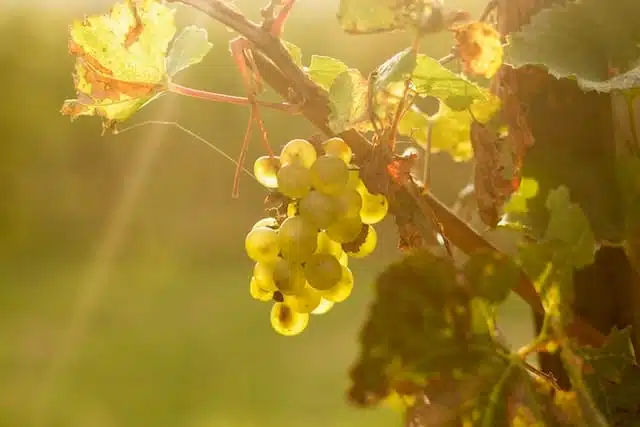Organic wine flourish at wine merchants over the seasons.
However, it would be more accurate to speak of “wines from organic farming” rather than organic wine, because France has only regulated the management of the vineyard, and not the vinification.
What are the specifications for producing an organic wine?
Organic wine producers are required not to use synthetic fertilizers or phytosanitary products. The winegrowers producing organic wine aim to maximize the defenses of the vine to limit treatments as much as possible.
These are sulfur or copper based and are applied to control common diseases like mildew or powdery mildew. The winegrower must pay greater attention to his vineyard: the production of organic wines requires 20% to 30% additional labor compared to a conventional wine.
What about the taste of organic wine ?
In fact, in the opinion of many experts, organic wines have little to envy to “traditional” wines in terms of taste. But despite this observation, the great castles are still only a minority to make the transition to this mode of cultivation. Several reasons can explain this situation: consumers may not have assimilated the quality of organic wines either and their lack of taste difference. In addition, adding a macaroon on the label of a grand cru can be a task.
We invite you to do the taste test of organic wine by yourself, with Wikeeps storage and service systems! Thanks to the Essential and Prestige systems, you can serve and store your bottles for up to 20 days after opening. We also offer refrigeration systems, Wibox 2 and 4, to keep your wines at their ideal temperature.
Why have Organic wine gained popularity ?
We can say this is for several combined reasons …. reflecting a growing interest in environmentally friendly and sustainable practices in the food and beverage industry. Here are some key factors contributing to the popularity of organic wines:
- Environmentally Sustainable Practices:
- No Synthetic Chemicals: Organic vineyards avoid the use of synthetic pesticides, herbicides, and fertilizers. Instead, they rely on natural alternatives, promoting a healthier ecosystem and reducing harm to the environment.
- Biodiversity: Organic farming often involves practices that enhance biodiversity, such as cover cropping and the use of companion plants. This can contribute to soil health and overall vineyard resilience.
- Health Consciousness:
- Reduced Residual Chemicals: Organic wines are produced from grapes grown without synthetic chemicals, resulting in lower residual chemical content in the final product. Some consumers prefer organic options to reduce their exposure to potentially harmful substances.
- Quality and Flavor:
- Minimal Intervention: Organic winemaking often involves minimal intervention, allowing the natural characteristics of the grapes to shine through in the wine. This can result in a more authentic expression of the terroir, the unique combination of soil, climate, and grape varieties in a specific vineyard.
- Certification Standards:
- Strict Regulations: To be labeled as organic, wines must adhere to specific organic farming and winemaking standards set by regulatory bodies. These standards vary by country, but they generally involve restrictions on synthetic inputs and a commitment to sustainable practices.
- Consumer Awareness:
- Educated Consumers: As consumers become more educated about the environmental and health impacts of conventional farming practices, there is a growing demand for products that align with their values. Organic wines cater to this demand for more sustainable and responsible choices.
- Market Trends:
- Growth in Organic Market: The organic food and beverage market, including wines, has experienced significant growth in recent years. This growth is driven by a combination of increased consumer awareness, preferences for natural and organic products, and a desire to support sustainable agriculture.
- Ethical and Social Considerations:
- Ethical Production: Many consumers choose organic products, including wines, as a way to support ethical and socially responsible practices in agriculture. This can include fair treatment of workers, community engagement, and overall commitment to ethical business practices.
It’s important to note that while organic wines have gained popularity, they may not appeal to everyone, and individual preferences for taste and style still play a significant role in wine choices. Additionally, the terms “organic” and “biodynamic” are sometimes used interchangeably, but they have distinct meanings and certification processes. Biodynamic wines go beyond organic practices and adhere to a specific set of principles outlined in biodynamic farming.
Also interesting: Coravin cartridge: A must-have for wine lovers
Find all the news of Wikeeps on Facebook and Twitter as well as all our products. See you soon !

